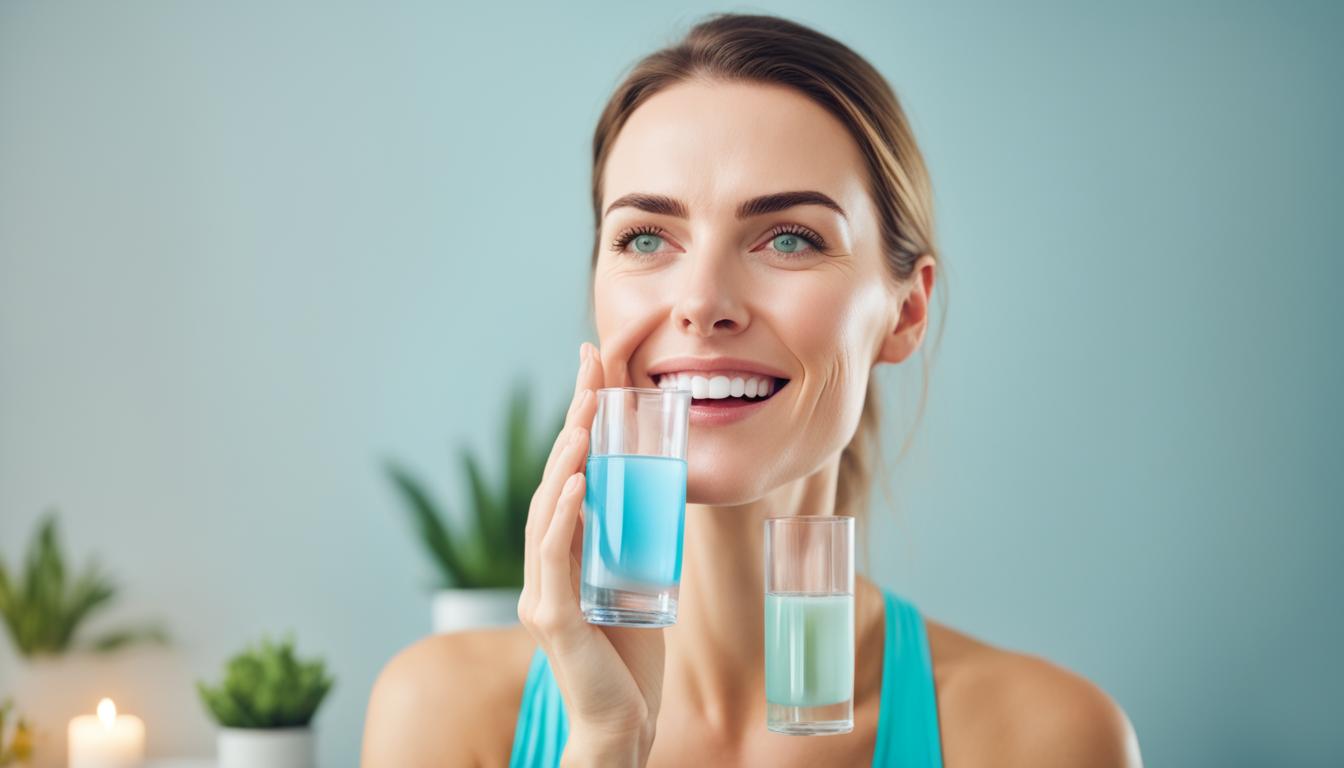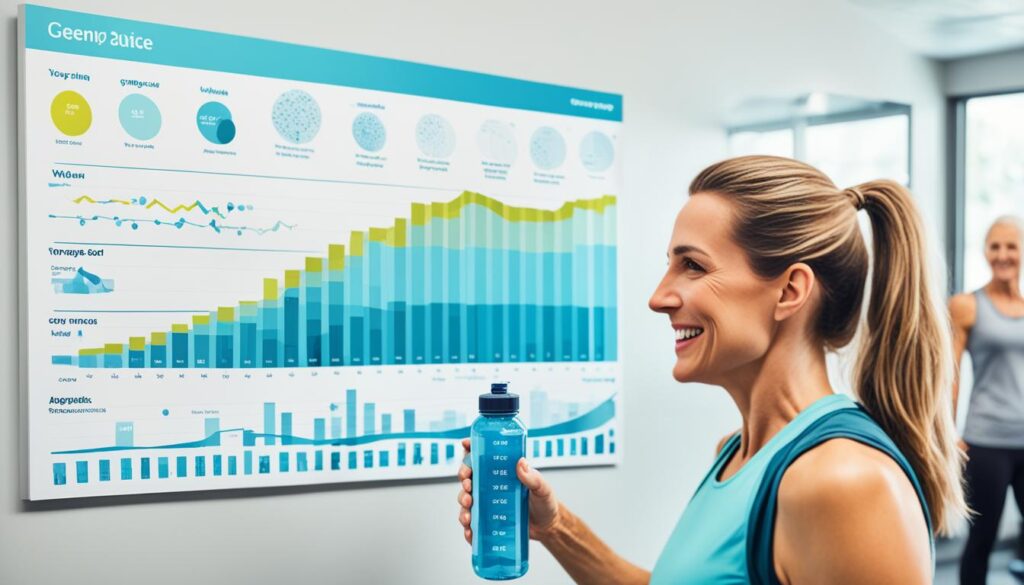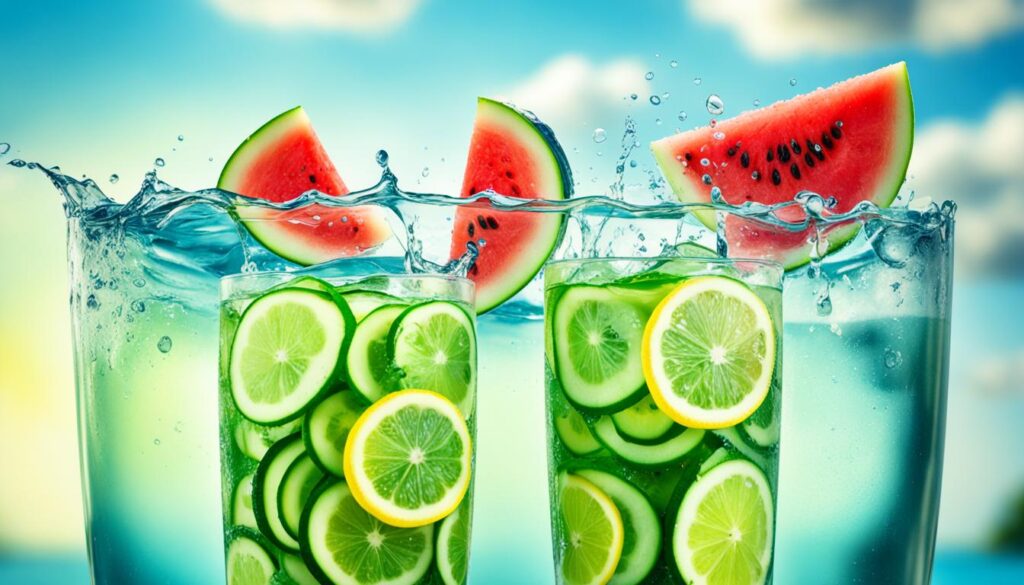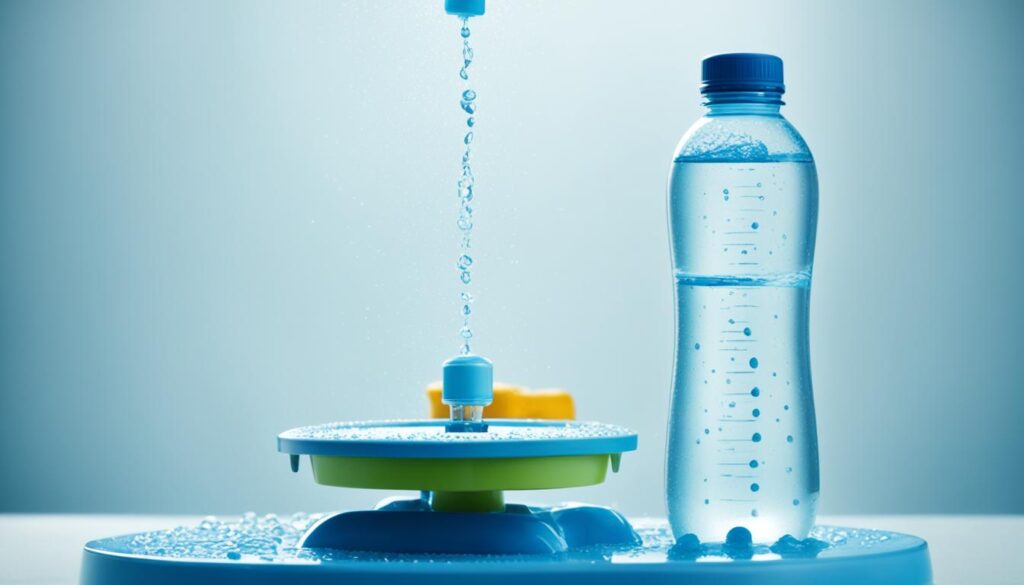Physical Address
304 North Cardinal St.
Dorchester Center, MA 02124
Physical Address
304 North Cardinal St.
Dorchester Center, MA 02124

Proper hydration is crucial for overall health and well-being. Learn about the importance of hydration, recommended water intake, signs of dehydration, and strategies to stay hydrated.
Keeping properly hydrated is key to feeling well and staying healthy. Water is important for our bodies. It helps us move nutrients to cells, removes waste, and keeps our joints and organs safe. Water also helps us stay at the right temperature.
Men should drink about 13 cups (3 liters) of water every day. Women should aim for 9 cups (just over 2 liters) daily. These are general amounts. The right amount of water can depend on how active you are, any health problems you might have, your size, and your gender.
Drinking enough water has many benefits. It keeps your body temperature in check. It can make you sleep better, think clearer, and feel happier. But not drinking enough (known as dehydration) can make you feel thirsty, tired, confused, and dizzy. For some people, like the elderly, babies, or sick individuals, dehydration can be very dangerous.
Our body weight is over half water, showing water’s key role. It helps in many vital ways, like regulating our body temperature and moving nutrients. Hydration is crucial for staying healthy.
Lack of water leads to dehydration, causing various issues. You might feel thirsty, tired, or get headaches. Severe dehydration can bring about serious health problems. To avoid these, drink enough water.
Water is essential for our body to work well. It keeps us cool, nourishes our cells, and removes waste. Ensuring you stay hydrated means these functions can do their job best.
Not drinking enough water causes dehydration. This leads to symptoms like thirst, tiredness, or confusion. It can even cause serious conditions. So, it’s vital to drink plenty of water for your health.
It’s important to drink enough water for good health. How much you need varies. Things like age, how active you are, and your health condition play a role in finding your perfect amount.
Men should try to drink around 13 cups of water each day. For women, about 9 cups does the trick. That’s roughly 3 liters for men and just over 2 liters for women.
For kids and teenagers, 6 to 8 cups daily is usually fine. Activity level, age, and weight decides the exact amount. If you’re pregnant, you should drink 10 cups daily. And moms who are breastfeeding need even more, around 12 cups a day.
Your need for water can change. Things like the weather, how hard you work out, and even some health issues or medicines matter. It’s key to adjust water intake to your own situation for the best hydration.

Drinking enough water is crucial during and after you work out. Your body loses water and salt when you sweat. So, it’s vital to stay hydrated to keep up your energy.
Experts advise drinking fluids before, during, and after exercise. For example, three to two hours before working out, drink 17 to 20 ounces of water. Within 30 minutes after, you should drink another 8 ounces. This helps keep your body fueled and your muscles working well.
Sports drinks are good for activities over an hour. They provide needed nutrients, such as potassium. But they’re also high in sugar, so water is usually a better choice for those who aren’t athletes.
| Hydration Recommendation | Amount |
|---|---|
| Pre-exercise (2-3 hours) | 17-20 ounces |
| Pre-exercise (20-30 minutes) | 8 ounces |
| During exercise (every 10-20 minutes) | 7-10 ounces |
| Post-exercise (within 30 minutes) | 8 ounces |
Remember to drink plenty of fluids and keep moving. This will keep your body and mind sharp and lessen the chances of getting sick from the heat. It also helps you feel your best and stay healthy.
https://www.youtube.com/watch?v=7-7RXc3OQr8
Water is the best choice for staying hydrated. It’s calorie-free, caffeine-free, and easy to find. You should drink water first to stay properly hydrated and enjoy the benefits of it.
Drinking water keeps you hydrated best. It’s a basic Hydrating Beverage that doesn’t have any bad extras, like sugar or caffeine. Adding water to your daily routine helps your health in big ways.
Drinks like coffee, tea, and soda can help with hydration. But, they might make you lose fluids because of their caffeine. It’s important to balance these drinks with enough water to stay fully hydrated.
Sugary beverages such as soda and fruit juices are not good choices. They have a lot of sugar, which can cause problems like weight gain and diabetes. Try to avoid these drinks for better hydration and health.

Choosing water as your main drink is best for staying hydrated. Also, remember to drink less Sugary Drinks and Caffeinated Drinks. This way, you take care of your hydration and health well.
Keeping track of your hydration levels is key for staying healthy. The color of your urine is a strong hint. If it looks colorless or light yellow, you’re likely well-hydrated. But, if it’s dark yellow or amber, you might be dehydrated.
The color of your urine gives a lot of info about your hydration status. Clear to pale yellow means you’re probably drinking enough. But, dark yellow or amber might mean you need more fluids.
There are also other signs that can tell you if you might be dehydrated:
If not treated, dehydration can cause harm. It’s not just feeling thirsty or tired. It can lead to organ issues and heat sickness. Knowing the signs of dehydration helps keep you on track with hydration. This supports your health and well-being.
Proper hydration is key for all, but some are more likely to get dehydrated. It’s important to know these high-risk groups. They should work extra hard to stay hydrated for good health.
Active individuals like athletes lose a lot of fluid and electrolytes when they sweat. This means they’re at a high risk for dehydration. They need to keep an eye on their hydration to avoid problems, like heat illnesses.
Older adults also face a bigger dehydration risk. Thirst senses weaken with age, making it tough to know when to drink more fluids. They might have less water in their bodies too, upping their dehydration chances. Studies find that between 8% and 16% of older adults over 70 can suffer from dehydration, which is more than thought before.
People with certain medical conditions or on certain medications have a higher dehydration risk. Conditions like diabetes, kidney problems, and stomach troubles can make it hard for the body to balance its fluids. Medications like diuretics and laxatives can also cause more fluid loss. Knowing these risks is vital for such people. They must take steps to ensure they stay well-hydrated.
Staying hydrated is key for your health and energy. Lucky for us, there are easy ways to keep up with our hydration needs. This includes doing simple things to remember to drink enough water.
A reusable water bottle keeps water close all the time. With it by your side, you’ll sip more often, keeping your body hydrated day long.
Adding fruits, herbs, or veggies to water makes it tasty. This trick helps us drink more water. The great taste makes us desire more water intake.
Water and exercise are best friends. It’s important to drink water before, during, and after youexercise. This keeps your body’s hydration levels balanced.
Pairing water with your meals is smart. It helps you meet your daily water goals. Drink some water before, during, or after your meals. It really adds up to your hydration for the day.

Dehydration is often talked about, but drinking too much water can also be harmful. This issue is called overhydration or water intoxication. It can happen when someone drinks a lot of water quickly, throwing off their body’s electrolyte balance. This mainly affects sodium levels. Signs of overhydration are feeling sick, getting headaches, muscle cramps, tiredness, and not thinking clearly. Yet, for most, not drinking enough is a bigger worry than drinking too much. It’s crucial to keep the right fluid intake for good health. If you’re worried about how much water you should drink, it’s best to talk to a doctor or nurse.

While sports drinks help during hard, long exercises, most people don’t need them. They have sugar and carbs but also come with sugar. For everyone else, water is the top pick to stay hydrated.
Water fits the bill for everyone else in need of hydration during workouts. Athletes doing tough, long exercises for over an hour can benefit from sports drinks. That’s because they help replace water and salts lost from sweating.
Energy drinks are not great for hydration because they have lots of caffeine. They can throw off your body’s water balance and cause dehydration. Kids and teens, in particular, should watch out for them since they can be bad for health.
Keeping hydrated is crucial for our health. You can tell a lot about someone’s hydration levels by looking at their urine color. If urine is light, like pale yellow, they’re usually well-hydrated. But if it’s dark yellow or amber, they might be dehydrated.
The color of urine tells us about hydration levels. A light, pale yellow means you’re probably getting enough to drink. However, a darker yellow or amber color could mean the opposite – you might be dehydrated.
There are more than one way to check if you’re drinking enough. Feeling alert, having normal bathroom trips, and having clear skin and hair are good signs. These are all signs that your body is well-hydrated.
So, pay attention to how your body feels. It can tell you when to drink more water.
Staying hydrated is key to being healthy. It helps control body temperature and keeps our joints and organs working well. Drinking enough water improves sleep, cognition, and our mood. Adequate hydration also aids in weight management. When we drink water, we feel full and eat fewer calories. It has been proven that good hydration boosts thinking, focus, and remembering. For both our bodies and minds, keeping hydrated is important.
Proper hydration and health are closely connected. Being well-hydrated lets our body work better. This means our temperature, joints, and organs are all doing their best. Good hydration also helps us sleep well, improves our mood, and sharpens our mind. By drinking enough water, we can feel our best and enjoy these benefits of proper hydration.
Hydrating well can support managing our weight. When we drink water, we sometimes eat less. This helps with controlling our weight. Water also boosts our metabolism. A good metabolism helps our body work smoothly. It’s a smart move for anyone wanting to stay healthier and in shape.
Hydrating right improves how our brain works. Enough water makes us think, focus, and remember better. If we don’t drink water, we might feel tired, get headaches, or feel confused. Keeping hydrated is good for our mind and thinking ability. It helps us function at our very best.
Staying hydrated is key to good health. Water is essential for many functions in our bodies. It helps keep our temperature right and our minds sharp.
Knowing how much water to drink and spotting dryness signs are important. By staying hydrated, we can feel our best. This keeps our health and wellness in check.
Research shows how vital water is for everything from thinking clearly at school to healing after exercise. It proves that staying hydrated helps us do well and stay healthy.
Choosing to drink enough water makes a big difference. It benefits our bodies and minds a lot. So, let’s make sure to drink up and feel the difference!